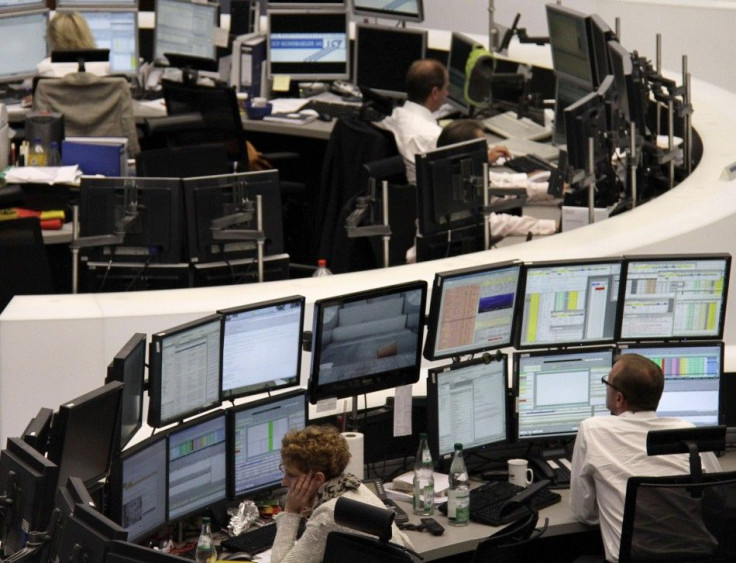U.S. Stock Market: Dow?s Wild Ride May Continue, on Societe Generale Woes
Analysis

Now, if you have a wife and twos kids, or a husband and two kids, and a ton of errands to do on a Saturday or later this weekend, the last thing you want to do is take time out of your day to read and learn about how some France bank with a funny-sounding name, Société Générale, could affect your life.
But Société Générale could.
Further, if you own U.S. stocks, you really should pay attention to what's going on at Société Générale.
Here's the reason:
The U.S. stock market has just completed its wildest week since the 1987 stock market crash. The Dow Jones Industrial Average (DJIA) rose or fell more than 400 points for four straight days last week, and then closed out the frenetic week by rising 126 points on Friday to 11,269.
For the week, the Dow was down just 1.5 percent, but it occurred after the Dow had already plummeted about 1,200 points or 11 percent on concern about Europe's debt-plagued nations, and on the protracted, partisan fight in the U.S. between the Democratic and Republican parties that delayed the raising of the U.S. debt ceiling until just before a possible U.S. Government default.
In other words, last week's roller-coaster Dow action was not indicative of a stock market that's stabilizing. Going in to last week institutional investors -- the "big guns" such as hedge funds, investment funds, and pension funds that determine where the market is headed -- were concerned that the U.S. debt deal would help balance the budget but that it would also take even more demand out of the U.S. economy, making a tepid recovery even weaker, and they were also concerned about the impact of Standard & Poor's (S&P) controversial downgrade of the U.S. Government's credit rating on interest rates.
The institutional investor world's bulls and bears fought it out last week -- inconclusively -- in a battle that literally involved trillions of dollars in stocks, bonds, and other investments.
Keep One Eye on Société Générale...
Then late in the week chatter arose deep in Wall Street's Concrete Canyon that the French bank with that funny-sounding name -- Société Générale -- had large holdings of debt in high-risk Europe nations such as Greece and in other, comparable, risky investments, including those in its home nation, France.
And now you know why, if you own U.S. stocks, you really should pay attention to what's going on at Société Générale.
Most U.S. investors learned two years ago why Greece matters. Greece triggered the second wave of the global financial crisis -- the collapse of U.S. investment bank Lehman Bros. was the first -- and it is only because the European Union, led by Germany and France, intervened to stabilize Greece with a €109 billion or $155 billion extension of credit/refinancing mechanisms that the U.S. and global credit markets did not freeze-up the way they did during the financial crisis' acute stage in the fall 2008 / winter 2009.
During that terrible 2008 / 2009 period, as most U.S. investors know, such industrial giants as General Electric (GE) had trouble getting a short-term loan, and banker-to-banker mistrust soared: banks were not only afraid to lend to businesses and the public, they were afraid to lend to eachother.
As noted, that E.U. action checked contagion and fear in Greece at that time, but now it appears Société Générale may have to be addressed.
Société Générale is a major player in the derivatives market and other exotic investment classes. A possible downgrade of the government of France's credit rating, and/or any sign of continued debt servicing problems by Greece, would weigh on Société Générale's operations, and, equal significant -- would ripple across Paris and London in Europe to New York in United States because the bank is a systemically important institution.
...And Another Eye on the ECB, Fed, BOE, BOJ
In other words, Société Générale, like AIG and Citigroup et al before it, is, in the finance and economics phraseology, "too big too fail."
Translation: Société Générale's status will help determine where your stocks are headed, near-term. Bad news in France for Société Générale almost certainly means more large declines for the Dow and for U.S. stocks, in general.
Hence, keep your eye on Société Générale and on the decisions by policy makers take to stabilize it, if required.
Monetary Policy/Market Analysis: The calculation here argues that word of additional operational concerns at Société Générale would likely require European Union intervention, most likely in coordination with the European Central Bank (ECB) and with the world's other, major central banks -- the U.S Federal Reserve, Bank of England (BOE), Bank of Japan (BOJ), Swiss National Bank (SWB), and possibly the People's Bank of China (PBC).
Further, do not heed the policy recommendations of the Tea Party. Had the policies of this small, vocal but misguided faction been implemented during the initial wave of the financial crisis, a functioning, modern financial system probably would not exist today. It is only due to the innovative and prudent decisions of the U.S. Federal Reserve, led by Fed Chairman Ben Bernanke, and in coordination with the aforementioned other, major central banks, such as the ECB, that credit markets remain functioning and liquid today, giving the U.S., European, and global economies a chance to heal and progress to a self-sustaining economic recovery.
© Copyright IBTimes 2024. All rights reserved.





















